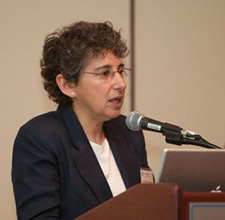Three years ago, Glassgold made the transition from psychologist with a private practice in Highland Park, New Jersey, to policy advisor in Congress. Though the two careers may seem to have little in common, Glassgold said she has found a way to influence national legislation on issues for which she has long advocated – health care reform and women's health.
"As a psychologist, you're involved with change at the individual level," she said, before heading to three consecutive meetings on health care. "Even when you're teaching, you're engaged with people at the group level. But this is a bird's eye view, when you think about policies and programs that affect millions of people."
After graduating from Rutgers' Graduate School of Applied and Professional Psychology (GSAPP) in 1989, Glassgold became a contributing faculty member and taught classes in community psychology, diversity, and minority mental health from 1990 to 2010. Her research has focused on lesbian, gay, bisexual, and transgender issues, and she has co-written three books that address the relationship between psychology and sexual orientation.
In 2009, Glassgold, whose bachelor's degree from Harvard is in government, arrived in Washington after being awarded The Catherine Acuff Congressional Fellowship by the American Psychological Association. Through the fellowship, designed to give mid-career psychologists an opportunity to integrate psychology into public policy, Glassgold was assigned to work for California Representative Xavier Becerra, a Democratic member of the House Ways and Means Committee.
"Judy is someone who even before she got the fellowship, was keenly interested in public policy and bringing psychology to bear on public policy," said Clinton Anderson, associate executive director of APA's Public Interest Directorate, who has known Glassgold for 20 years. "The fellowship was just another step in a progression that she's been in for some time."
At the end of her yearlong fellowship, Glassgold decided to remain in Washington because she wanted to help implement the new health care reform legislation signed by President Obama in March 2010. Five months later, she joined the staff of Representative Levin as a senior policy advisor for health and domestic social policy. Her responsibilities include keeping track of trends in health care, recommending positions to the congressman, representing him in meetings on Capitol Hill, and communicating with constituents and health care providers in Michigan.
Stan Messer, dean of the GSAPP, said Glassgold's work in Congress fits the model of applying psychology to the broader community that the graduate school has developed. "It doesn't surprise me in a way that Judy is ending up working in an area like policy, particularly in areas like health care, social security and unemployment, because it's in keeping with her values as a community-oriented psychologist and a social activist," said Messer, who taught Glassgold while she was in graduate school.
As a staff member for a Democratic Congressman in the Republican-controlled house, Glassgold admits that her work is both exciting and frustrating. "It's the best of times and the worst of times," she said. "The house is a very active place. We're in the minority so we face what we view as a lot of bad legislation that can be harmful. Legislation that my boss writes will not be voted on the floor because the Republicans will block it."
Despite those drawbacks, she said working in the House offers her a "fabulous learning experience in how policy is created. When you're a private psychologist, you deal with your patient's concerns," she said. "You don't get to see the big picture."



